#treaty of Amiens
Text
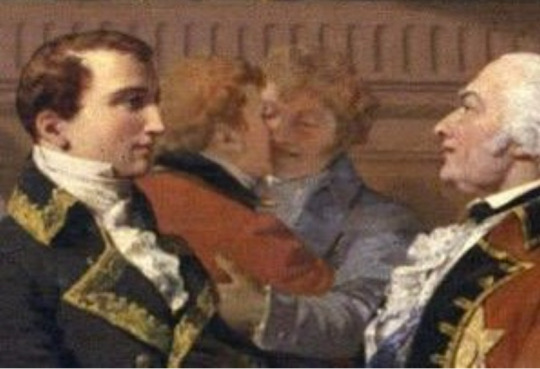
I like that there are two dudes having a moment in the background during the signing of the treaty of Amiens.
(Also, it’s not clear if the dude in the front left is Joseph or Napoleon)
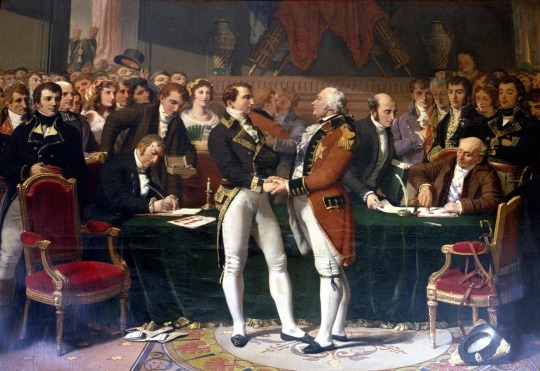
Painting: The Peace of Amiens by Jules-Claude Ziegler
#Jules-Claude Ziegler#Ziegler#napoleon#napoleonic era#napoleonic#napoleon bonaparte#first french empire#joseph bonaparte#Joseph#Napoleon’s brothers#19th century#french empire#the peace of Amiens#Amiens#treaty of Amiens#peace of Amiens#history#french revolution#coalition wars#napoleonic wars#Cornwallis#queer#queer history#gay history
108 notes
·
View notes
Photo
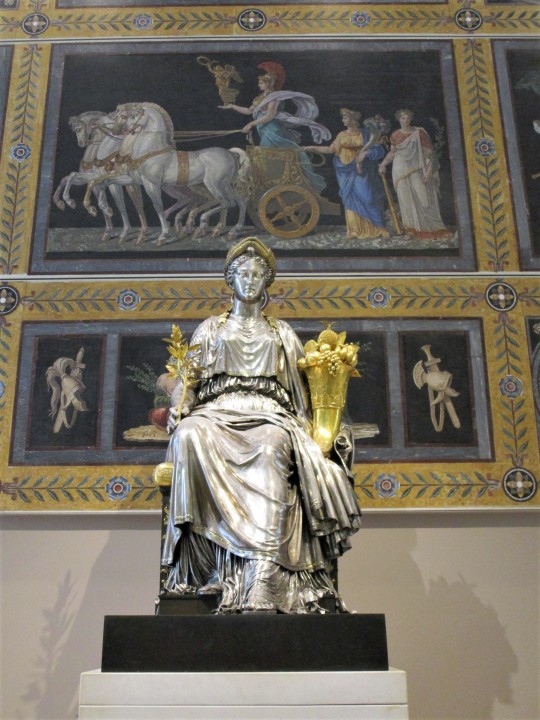
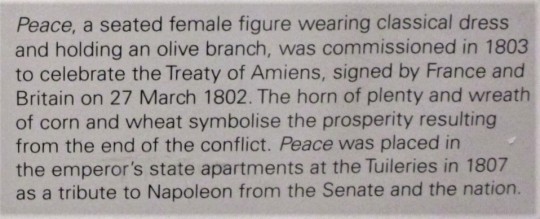
Peace, silver, gilt silver, bronze, gilt bronze, 1806, by Antoine-Denis Chaudet
Louvre Museum, Paris
19 notes
·
View notes
Text
1803-The United Kingdom revokes the Treaty of Amiens and declares war on France
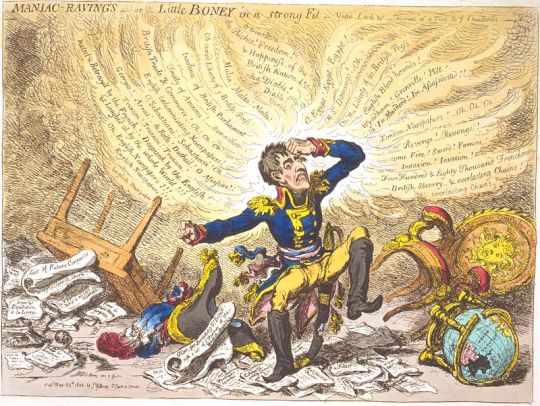
0 notes
Photo

War of the Second Coalition
The War of the Second Coalition (1798-1802), part of the broader French Revolutionary Wars, was the second attempt by an alliance of major European powers to defeat Revolutionary France. The Second Coalition, which included Russia, Austria, Great Britain, Naples, Portugal, and the Ottoman Empire, was defeated by the French Republic, and hostilities ended with the Treaty of Amiens in 1802.
Continue reading...
34 notes
·
View notes
Note
Had the Grand-Master of the Order not opened the harbor to Napoleon, would the knights of st John been able to hold out against the French on Malta? Furthermore, after Napoleons defeat and exile did the order petition the Vienna congress for the return of their island?
They had the resources to hold out at Valetta, but with the desertion of many French knights, Napoleon could have left forces to besiege the fortress. So it's a question of whether Napoleon decides he can't spare the manpower to siege Valetta and hurry on to Egypt.
The Knights were actually promised the island in the Treaty of Amiens, so no need to petition the Vienna Congress. But Britain was never going to give up such a useful island base, so nothing ever came of it.
Thanks for the question, Anon.
SomethingLikeALawyer, Hand of the King
9 notes
·
View notes
Text
the 19th century research
The 19th century began on 1 January 1801 , and ended on 31 December 1900. Napoleon Bonaparte, Emperor of the First French Empire. The 19th century was characterized by vast social upheaval. Slavery was abolished in much of Europe and the Americas.
the people in the 19th century had very interesting fashion which consisted off grand ball gowns
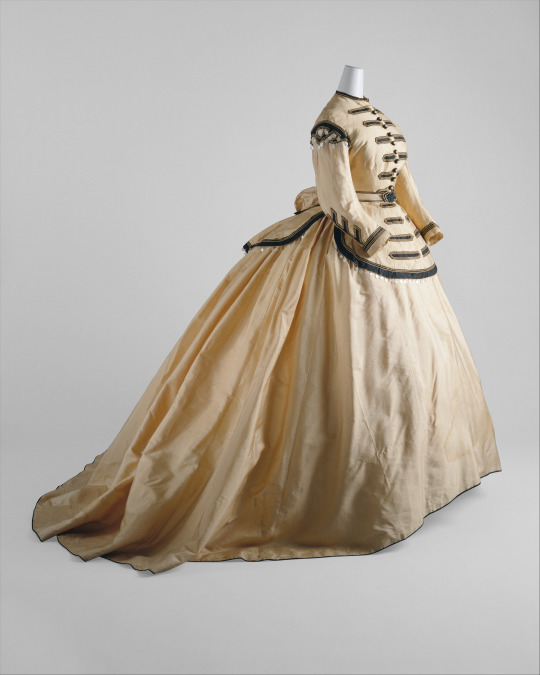
what I like about the 19th century is their big skirts, I do add long lavish skirts to my original characters just because they're pretty and nice, I also like the colours and the shape of the dress which is a kind of off white
during the 19th century multiple major events went on which consisted of ;
·̩̩̥͙**•̩̩͙✩•̩̩͙*˚ ˚*•̩̩͙✩•̩̩͙*˚*·̩̩̥͙
The Napoleonic Wars (1802-1815)
Following the Revolutionary Wars in France, with Napoleon positioning himself as Emperor of the French Empire, over a decade of war in Europe followed, as nervous neighbors hoped to dethrone the General. Not afraid to get on the battlefield to force his politics, Napoleon conquered Italy, much of Spain, and by 1812 ruled most of Continental Europe. Britain and Russia remained thorns in his side, coalition forces rallied against Napoleon and ousted him, forcing him to exile on the island of Elba. After an escape and a brief resurgence, he was defeated for good at the Battle of Waterloo (1815), exiled permanently to Saint Helena where he would die, and the French monarchy was restored.
during the napoleonic war the British was against the French, the British was irritated by the French for several actions during following the treaty of the Amiens
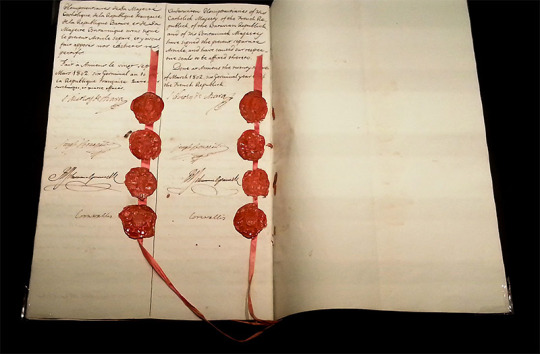
the treaty of Amiens was a treaty signed at Amiens, by the French, British, Spain, and the Batavian Republic (the Netherlands), achieving a peace in Europe for 14 months during the Napoleonic Wars.
because my cult is set in a Australia esc place I have decided to look more into the Australian side of history which I do not do often so do not mind if I get anything wrong
2 notes
·
View notes
Text
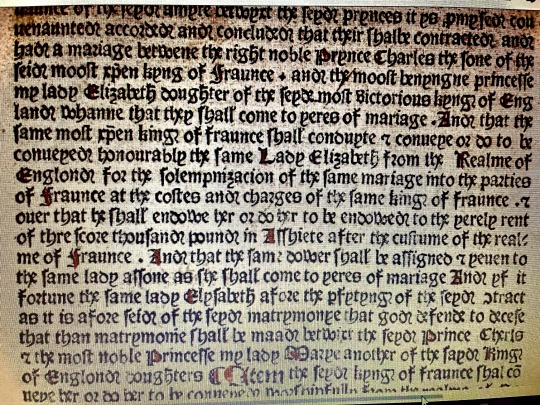
Excerpt of the Anglo-French treaty upon which was arranged the betrothal between Dauphin Charles of France and the lady Elizabeth of England.
“(...) shalbe contracted and had a mariage betwene the right noble Prynce Charles the sone of the seid most xp̄en kyng of Fraunce. and the moost benyngne princesse my lady Elizabeth doughter of the seyde most victorious kyng of England, etc. [Dated: Amiens, 29 Aug. 1475.”
#elizabeth of york#charles viiii#house of york#house of valois#plantagenet dynasty#edward iv#louis xi#primary sources#medieval England#public domain#bl.uk
8 notes
·
View notes
Text
love when you look up historical events on wikipedia and they hit you with a political cartoon as the main page image. i just looked up the treaty of amiens and was delighted to see this front and center
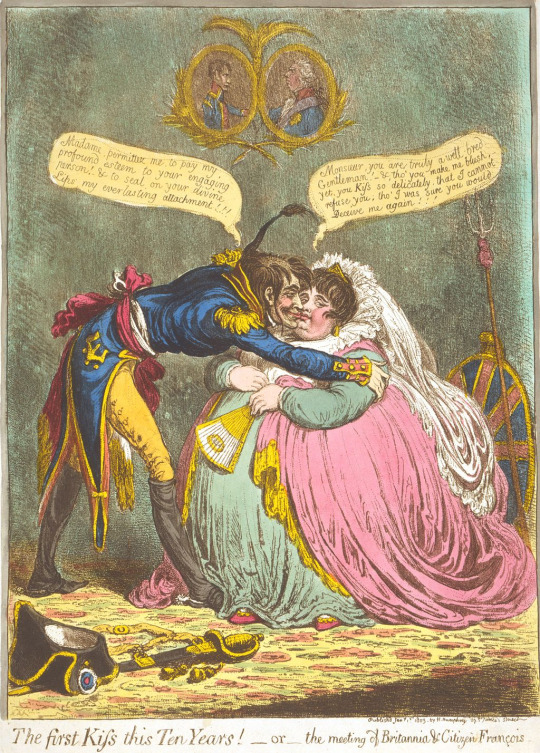
5 notes
·
View notes
Photo
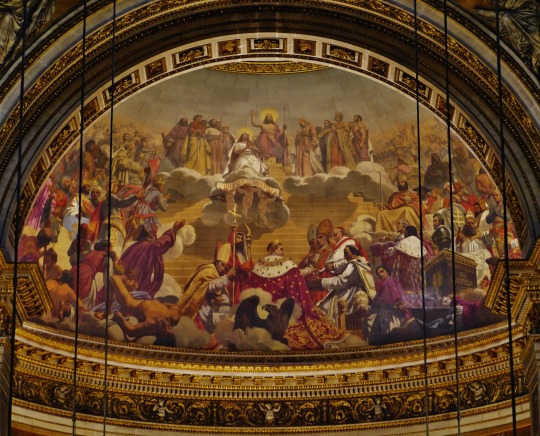
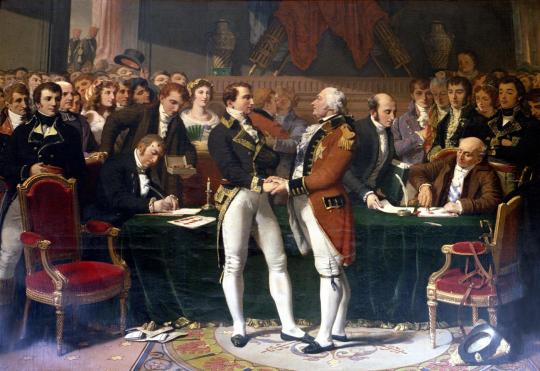
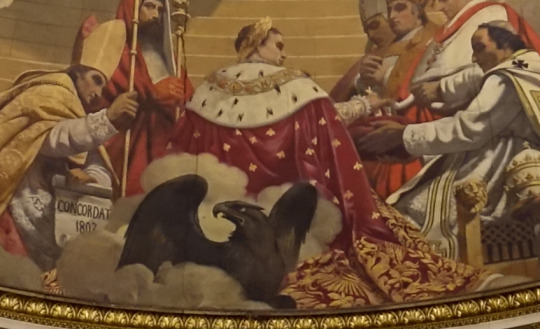
Works by Jules-Claude Ziegler. The Treaty of Amiens; and Napoleon in la Madeleine Church, as part of The History of Christianity!
commons.wikimedia.org
#tributes to Napoleon in churches#Napoleon the star of the history of Christianity#well he did something for it
8 notes
·
View notes
Text
Glory
CW for mention of historical enslaved people, heavy implications of sexual intimacy between main characters (T-rated)
21 Floréal, Year X
(11 May 1802)
“First Consul for life,’” repeats Marius, resting his chin in his hand with a grin. “It has a fine ring to it.”
“It does at that.” Napoléon rolls over in bed, admiring the way the mid-morning sunlight illuminates Marius’s bare skin. It isn’t often that he allows himself the luxury of basking in such moments, but since the signing of the Treaty of Amiens two months earlier, he’s been spending a lot more time focusing on what’s immediately around him. A finger raises to trace the soft curve of Marius’s ear before drifting to tug affectionately at the lobe twice.
Marius bats away his hand, eyes still shining. “Think of the opportunity! Everything you could do! Why, as First Consul you were already able to establish a system of public education, and with the English out of the way, you can focus on the improvement of the lives of the people in other ways, too!”
Napoléon smirks. “It sounds as though you already have something in mind.”
“Well … what about water?”
“Water,” repeats Napoléon with flat amusement. It’s been some time since Marius has visited a coiffeur, and Napoléon busies himself playing with the dark coil of hair beginning to trail down the back of his neck.
This time Marius doesn’t bother stopping him. “Running water. Many Parisians don’t have access to it, but if we could divert some from the Seine, it could provide much-needed drinking water to the masses.” Napoléon has begun placing slow, careful kisses along Marius’s bare shoulder (which may perhaps have been the long-term objective all along), and Marius falters when Napoléon reaches the joiner between it and his neck. “You’re not even listening to me.”
“I am,” he insists. “Water, channel, drinking. Go on.”
Marius rolls his eyes but continues as Napoléon rearranges himself to move to Marius’s other shoulder. “I was thinking, though, that it could also help with shipping. The Seine has a lot of traffic right now, but if we have a channel, it could provide another conduit for transit, maybe even throughout the whole city.”
Napoléon reaches the opposite shoulder cap with a loud, smacking pop. “I think that sounds like a fine idea. I’ll draft a proposal this afternoon.” There will be the matter of funding to consider, as well as selecting the right person to oversee the project, and labor will be its own task to sift through, but those are missions for times and places that are not mid-morning in his bed with Marius.
Marius, however, does not seem to agree. “And Saint Domingue! With slavery abolished, think of the opportunities we have to set an example for the rest of the world!”
Napoléon hums noncommittally into Marius’s spine. With no enslaved people working the plantations, Saint Domingue is currently hemorrhaging money. They will need it up and running again if they want to be able to compete with the English in the sugar market; this, however, is nothing Marius needs to know. Not now, and perhaps not ever.
“Just think,” sighs Marius. “France’s first democratically-elected First Consul for life. First peacetime in over a decade. First country to spread democracy throughout Europe.” He looks over his shoulder at Napoléon as warning before flipping onto his back. Napoléon settles over Marius’s chest, resting his chin over Marius’s sternum and in his own crossed arms. “The possibilities are infinite.”
“We are infinite,” Napoléon agrees, pushing himself forward to press his mouth to Marius’s.
Marius laughs into the kiss, and for a moment the world boils down to their lips against one another and the places where their bodies touch; Marius’s hands find Napoléon’s chest, however, and push him away, looking up at him with a sort of blissful wonder. “Do you remember when we visited Alexander’s tomb? In Alexandria?”
“Oh, not the other tomb of Alexander?” Napoléon receives a well-earned smack to his shoulder for that, and he grins, leaning down to place a kiss along Marius’s jawline. “Yes, I do recall.”
“And how we stripped down to race, like Alexander and Hephaestion did at the tombs of Achilles and Patroclus?”
A glorious day. “I remember you losing,” he murmurs into the hollow behind Marius’s ear with a smile.
Marius scoffs. “If it were for speed and not endurance, things might have been different.”
“Have you considered that I may have strategized around your unreasonably long legs?”
“It has occurred to me.” Now that he’s on his back, Marius’s hair is a mess. They can probably put off getting it cut another day or two. “We should go back. In August.”
Napoléon has returned to Marius’s jawline. It’s an excellent jaw. “And why is that?”
“You’ll be thirty-three.”
His neck is excellent, too. “Yes?”
“Alexander died at 32.”
Napoléon freezes. Sits up. Stares at Marius.
“Only if you want, of course.”
He wants. He wants very badly. “The Senate will be wanting to celebrate my birthday.”
“It doesn’t have to be the same day.”
“I’ll have to stay in France, if not Paris, to oversee the infrastructure projects.”
“It doesn’t have to be this year.”
He wants it to be this year. “First chance we get,” Napoléon decides. “You and I will return to Alexandria and have our rematch.”
“To honor Alexander and Hephaestion?” asks Marius.
“To honor us.”
Marius smiles. “Then we have all the time in the world.”
#shitposting sometimes writes#empereur's mercy week#empereur's mercy#napontmercy#marius x napoléon#three francs
6 notes
·
View notes
Text
Events 3.25 (Before 1920)
410 – The Southern Yan capital of Guanggu falls to the Jin dynasty general Liu Yu, ending the Southern Yan dynasty.
421 – Italian city Venice is founded with the dedication of the first church, that of San Giacomo di Rialto on the islet of Rialto.
708 – Pope Constantine becomes the 88th pope. He would be the last pope to visit Constantinople until 1967.
717 – Theodosius III resigns the throne to the Byzantine Empire to enter the clergy allowing Leo III to take the throne and begin the Isaurian dynasty.
919 – Romanos Lekapenos seizes the Boukoleon Palace in Constantinople and becomes regent of the Byzantine emperor Constantine VII.
1000 – Fatimid caliph al-Hakim bi-Amr Allah assassinates the eunuch chief minister Barjawan and assumes control of the government.
1065 – The Great German Pilgrimage is attacked on Good Friday by Beduin bandits, suffering heavy losses.
1306 – Robert the Bruce becomes King of Scots (Scotland).
1409 – The Council of Pisa convenes, in an attempt to heal the Western Schism.
1410 – The Yongle Emperor of Ming China launches the first of his military campaigns against the Mongols, resulting in the fall of the Mongol khan Bunyashiri.
1519 – Hernando Cortes, entering province of Tabasco, defeats Tabascan Indians.
1576 – Jerome Savage takes out a sub-lease to start the Newington Butts Theatre outside London.
1584 – Sir Walter Raleigh is granted a patent to colonize Virginia.
1655 – Saturn's largest moon, Titan, is discovered by Christiaan Huygens.
1708 – A French fleet anchors nears Fife Ness as part of the planned French invasion of Britain.
1725 – Bach's chorale cantata Wie schön leuchtet der Morgenstern, BWV 1, is first performed on the Feast of the Annunciation, coinciding with Palm Sunday.
1770 – Daskalogiannis, leads the people of Sfakia in the first Greek uprising against the Ottoman rule
1802 ��� The Treaty of Amiens is signed as a "Definitive Treaty of Peace" between France and the United Kingdom.
1807 – The Swansea and Mumbles Railway, then known as the Oystermouth Railway, becomes the first passenger-carrying railway in the world.
1811 – Percy Bysshe Shelley is expelled from the University of Oxford for publishing the pamphlet The Necessity of Atheism.
1821 – Greek War of Independence: Traditional date of the start of the Greek War of Independence. The war had actually begun on 23 February 1821 (Julian calendar).
1845 – New Zealand Legislative Council pass the first Militia Act constituting the New Zealand Army.
1865 – American Civil War: In Virginia during the Siege of Petersburg, Confederate forces temporarily capture Fort Stedman from the Union before being repulsed.
1894 – Coxey's Army, the first significant American protest march, departs Massillon, Ohio for Washington, D.C.
1905 – The Greek football club P.A.E. G.S. Diagoras is founded in the city of Rhodes.
1911 – In New York City, the Triangle Shirtwaist Factory fire kills 146 garment workers.
1911 – Andrey Yushchinsky is murdered in Kiev, leading to the Beilis affair.
1914 – The Greek multi-sport club Aris Thessaloniki is founded in Thessaloniki.
1917 – The Georgian Orthodox Church restores its autocephaly abolished by Imperial Russia in 1811.
1918 – The Belarusian People's Republic is established.
1919 – The Tetiev pogrom occurs in Ukraine, becoming the prototype of mass murder during the Holocaust.
0 notes
Text

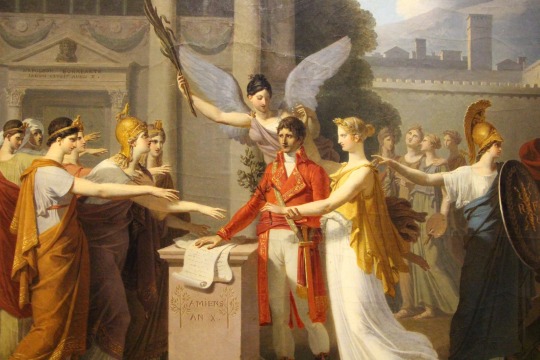
Detail of Napoleon in The Peace of Amiens, by Anatole Devosge
The Peace of Amiens was the treaty in 1802 which ended the War of the Second Coalition. The peace would be short lived as Britain would declare war on France one year later. It was, however, the only period of general peace in Europe since the start of the Coalition Wars in 1792.
#Napoleon#napoleon bonaparte#Anatole Devosge#the consulate#Devosge#painting#first consul#napoleonic#napoleonic era#first french empire#French empire#France#history#peace of Amiens#Amiens#treaty of Amiens#1800s#19th century#art#art history#history of art#french revolution#frev#french history#Bonaparte#historical art#neoclassical#classical#neoclassicism#neoclassical art
21 notes
·
View notes
Text
England and France, two of the oldest nations in Europe, have had a long history of conflicts spanning centuries. Here are 20 significant wars and military conflicts between them, with brief details and outcomes:
1. **The Norman Conquest (1066)** - The Duke of Normandy (France) invaded England, leading to the Battle of Hastings where William the Conqueror defeated King Harold II.
- Winner: France
2. **The Angevin Empire Conflicts (12th Century)** - These were a series of conflicts over the control of territories in France by the Angevin kings of England.
- Winner: Varied by conflict, but ultimately France gained control over the territories.
3. **The Hundred Years' War (1337-1453)** - A series of conflicts fought over the right to rule the Kingdom of France.
- Winner: France
4. **The War of Saint-Sardos (1324)** - A conflict over Gascony, leading to a brief military campaign.
- Winner: France
5. **The Caroline War (1369-1389), part of the Hundred Years' War** - Marked by French successes and territorial gains.
- Winner: France
6. **The Lancastrian War (1415-1453), part of the Hundred Years' War** - England initially achieved significant victories, including Agincourt, but eventually lost all French territories except Calais.
- Winner: France
7. **The War of the League of Cambrai (1508-1516)** - Although not exclusively between England and France, both were involved in this larger conflict over territories in Italy.
- Winner: Inconclusive, with varied success for both.
8. **The Italian Wars (1494-1559)** - A series of conflicts where England and France were involved, often as part of opposing alliances.
- Winner: Varied by campaign, but France gained influence in Italy, though at a great cost.
9. **The War of the Spanish Succession (1701-1714)** - England (later Great Britain) fought against France as part of a Grand Alliance, contesting French expansion and the unification of French and Spanish thrones.
- Winner: England/Great Britain, leading to the Treaty of Utrecht limiting French influence.
10. **The War of the Austrian Succession (1740-1748)** - England and France fought in battles across the globe as part of broader coalitions.
- Winner: Inconclusive, though the Treaty of Aix-la-Chapelle returned territories to the status quo ante bellum.
11. **The Seven Years' War (1756-1763)** - A global conflict in which Britain and France fought in Europe, North America, and India.
- Winner: England/Great Britain, leading to significant territorial gains in North America and India.
12. **The American Revolutionary War (1775-1783)** - France supported the American colonies against Britain with naval battles and troops.
- Winner: France (in alliance with America), contributing to American independence.
13. **The Revolutionary Wars (1792-1802)** - As part of the First Coalition, Britain fought revolutionary France.
- Winner: Inconclusive, leading to the Peace of Amiens.
14. **The Napoleonic Wars (1803-1815)** - A series of major conflicts where Britain led coalitions against the Napoleonic French Empire.
- Winner: England/Great Britain, culminating in Napoleon's defeat at Waterloo.
15. **The Crimean War (1853-1856)** - Though not directly against each other, Britain and France were allies against Russia.
- Winner: Anglo-French alliance
16. **The Second Opium War (1856-1860)** - Again, Britain and France were allies, this time against Qing dynasty China.
- Winner: Anglo-French alliance
17. **The Suez Crisis (1956)** - Britain and France, alongside Israel, coordinated a failed invasion of Egypt to regain Western control of the Suez Canal and remove Egyptian President Nasser from power.
- Winner: Neither; under pressure from the United States and the Soviet Union, Britain and France were forced to withdraw, marking a significant decline in their global influence and no clear military victory.
18. **Fashoda Incident (1898)** - Although not a war, this was a significant diplomatic and military confrontation between France and Britain over control of the Sudan. The crisis ended without armed conflict, as France withdrew its claim, acknowledging British control over Egypt and Sudan.
- Winner: Britain, as France withdrew and British control over Sudan was acknowledged.
Given the historical context and evolution of international relations, finding direct military engagements specifically between England/Britain and France after the early 19th century becomes less common. However, focusing on indirect conflicts, alliances, and the Cold War period:
19. **Entente Cordiale (1904)** - While not a conflict, this is a significant turning point in Anglo-French relations. The series of agreements marked the end of centuries of rivalry and the beginning of a peaceful and cooperative relationship. This diplomatic accord led to the allies standing together through both World Wars against common adversaries.
- Winner: Both nations benefited from the stabilization of relations and mutual support in global conflicts.
20. **World Wars as Allies** - During both World War I (1914-1918) and World War II (1939-1945), Britain and France were allies against common enemies (Central Powers in WWI, Axis Powers in WWII). Their cooperation during these conflicts marked a significant shift from their historical rivalries to a lasting partnership.
- Winner: Together, Britain and France emerged victorious in both conflicts, although at great cost.
After centuries of conflict, the relationship between Britain and France evolved into one of cooperation and alliance, particularly evident in the 20th century and beyond, as both faced new global challenges.
The conflicts mentioned above highlight the complex and often changing dynamics of Anglo-French relations, ranging from outright warfare to alliances against common foes. In the earlier periods, territorial control in France was a major bone of contention, while later conflicts were part of broader European or global struggles for power and influence. The outcomes of these wars shaped the course of both nations' histories, influencing their territorial, political, and economic landscapes extensively.

0 notes
Text
active recall dump
so basically socialism was super french in the 1840s and it had beef with the emergence of individualism and fragmentation of industrial society
nationalism was so in during the napoleonic wars (paused for 14 months by the treaty of amiens) and the painting of the peace of Amiens by Jules Claude Zeigler is the one with the two men making out in the background
Pierre joseph proudhon, self proclaimed anarchist, said fuck the system and property is theft
0 notes
Video
youtube
Amazing Historical Events That Occurred on 3/25🎉 #shorts #history
March 25th is an important day in history for many reasons. On this day, remarkable events have occurred that have had far-reaching effects. In 708, Pope Constantine began his reign as the first Catholic Pope. This event marked the beginning of what would become one of the oldest, continuous religious institutions in the world. In 1199, King Richard I (the Lion Heart) of England was seriously wounded by a crossbow bolt while fighting the French. This event vividly illustrated the dangers of war and the bravery of Richard I.
In 1584, English explorer Walter Raleigh renewed Humphrey Gilbert's patent to explore North America. This event was an important step in shaping the New World, as it allowed Raleigh to embark on his famous voyage of exploration. In 1802, the Treaty of Amiens was signed between Great Britain and the French Republic. This treaty ended the long-running wars between the two countries, which helped to preserve the peace in Europe. Finally, in 1919, Woodrow Wilson's League of Nations became a reality with the adoption of the League Covenant. This event marked the beginning of international cooperation on a global scale, setting the stage for modern international organizations.
These amazing historical events that occurred on March 25th have shaped our world in significant ways. From the rise of the Catholic Church, to the exploration of America, to the preservation of peace in Europe, and the establishment of global cooperation, each event has had a profound impact on the course of history. If you're looking to learn more about these amazing historical events that occurred on March 25th, be sure to explore further and delve into the stories behind them.
Amazing Historical Events That Occurred on March 25th
In 708, Pope Constantine began his reign as the first Catholic Pope. In 1199, King Richard I (the Lion Heart) of England was seriously wounded by a crossbow bolt while fighting the French. Then, in 1584, English explorer Walter Raleigh renewed Humphrey Gilbert's patent to explore North America. In 1802, the Treaty of Amiens was signed between Great Britain and the French Republic. Finally, in 1919, Woodrow Wilson's League of Nations became a reality with the adoption of the League Covenant.
https://bit.ly/freebetwithCrypto
https://splinterlands.com?ref=mortonmattd1
https://bit.ly/getonHive
https://ecency.com/signup?referral=m0rt0nmattd
https://www.risingstargame.com?referrer=m0rt0nmattd
https://exode.io/?ref=790e9e1
https://bit.ly/WinCryptoWithMe
https://bit.ly/FreeCryptoDrip
https://bit.ly/FreeZECdrip
0 notes
Text
Lady Hamilton & Horatio Nelson: Horatia (part 33)
Lady Hamilton & Horatio Nelson: Horatia (part 33)
On 18 May 1803 Horatia was baptised in the parish church of St Marylebone, on the very same day that Britain declared war on France. This ended the peace inaugurated by the Treaty of Amiens in 1802, as a result of which the whole of Europe had experienced a period of peace for the first time since 1792.But after just fourteen months, without waiting for Napoleon to make the first move, the…
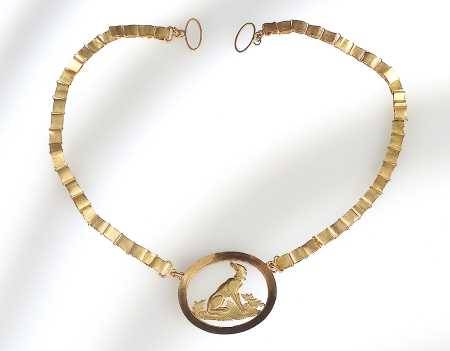
View On WordPress
#Brontë#crown#devil#dog#dream#Etna#ghost#Horatia#Lady Hamilton#legend#Napoleon#necklace#Nelson#pact#Pope#pregnancy#Queen Elizabeth#Sicily#slipper#war
0 notes